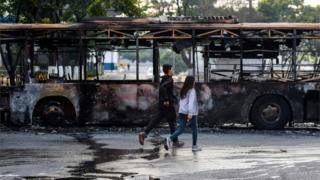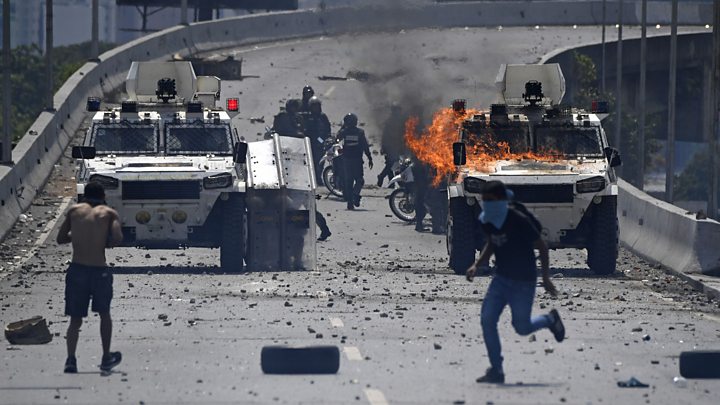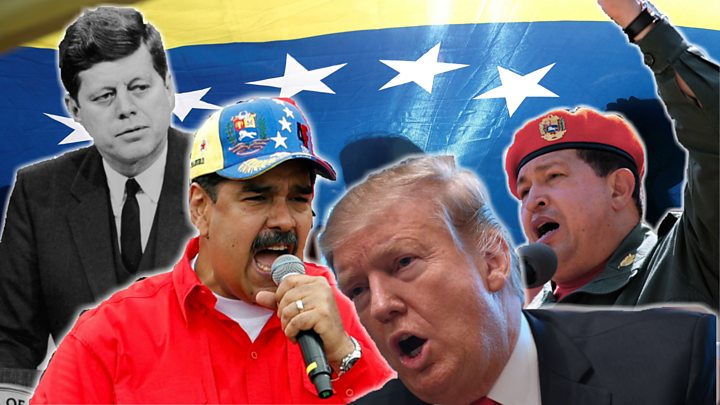 Image copyright
AFP/Getty
Image copyright
AFP/Getty
Venezuelans are expected to gather for mass protests on Wednesday after opposition leader Juan Guaidó called for fresh demonstrations.
It comes the day after President Nicolás Maduro said he had stopped an "attempted coup" by the opposition.
"Today we continue," Mr Guaidó tweeted. "We will keep going with more strength than ever, Venezuela."
Mr Guaidó says the armed forces now back the protesters, but Mr Maduro says they have not turned against him.
In a fiery television address on Tuesday, Mr Maduro accused protesters of "serious crimes" which he said would "not go unpunished", and said the US was plotting against him.
Mr Guaidó declared himself Venezuela's interim leader in January and has been recognised by more than 50 countries, including the US, the UK and most in Latin America.
But Mr Maduro - backed by Russia, China and the top of the country's military - has refused to cede leadership to his rival.
US Secretary of State Mike Pompeo said military action was "possible" if necessary but that the US would prefer a peaceful transition of power.
What's the latest?
Early on Wednesday Mr Guaidó retweeted a list of planned protest points in the capital, Caracas.
Demonstrators planned to gather at these locations at 10:00 local time (14:00 GMT). May Day is a public holiday in Venezuela.
Student and opposition groups have tweeted images of protesters massing in the streets amid reports of a large police presence.
Streets were littered with burnt-out vehicles after Tuesday clashes.
The opposition said protests took place throughout Venezuela, in the capital and across all its 23 states.
What happened on Tuesday?
Mr Guaidó posted a video showing him with a number of men in military uniform. He said he had the support of "brave soldiers" in Caracas.
He urged Venezuelans to join them in the streets, and appeared alongside another opposition leader, Leopoldo López, who has been under house arrest since 2014.
Supporters on both sides then gathered around Caracas throughout the day, and there were clashes between Mr Guaidó's supporters and armed military vehicles.

Spain's government later confirmed that Mr López and his family had sought safety in their embassy, but said the opposition figure has not claimed political asylum.
Chilean foreign minister Roberto Ampuero confirmed on Twitter he had initially come to their embassy but later transferred to Spain's.
Mr Guaidó, the president of the opposition-controlled National Assembly, has called on Venezuela's military to back him, saying President Maduro is a "usurper" because he was re-elected in polls that had been widely disputed.
What's been the international reaction?
UN Secretary General António Guterres has appealed for both sides to avoid violence, while the EU has called for "utmost restraint to avoid the loss of lives and an escalation in tensions".
The US has reiterated its support for Mr Guaidó.
Meanwhile, National Security Adviser John Bolton has accused Russia and Cuba of interfering in Venezuelan politics, claiming Mr Maduro was planning to flee to Cuba but was persuaded to stay by Moscow.
But both Russia and Mr Maduro rejected the claim, with a Russian foreign ministry spokesperson accusing the US of conducting an "information war".
Mr Pompeo planned to speak later with Russian Foreign Minister Sergei Lavrov, Mr Bolton said.

Governments who still back Mr Maduro - including Bolivia and Cuba - condemned Mr Guaidó's efforts as an attempted "coup d'etat".
The Mexican government expressed "concern about a possible increase in violence" while Colombian President Ivan Duque urged the Venezuelan military to stand "on the right side of history" against Mr Maduro.
An emergency meeting of the Lima Group of Latin American countries has been scheduled for Friday.